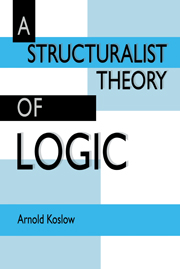Book contents
- Frontmatter
- Contents
- Preface
- Part I Background
- Part II Implication relations
- Part III The logical operators
- Part IV The modal operators
- Appendix A An implication relation for the integers in the programming language BASIC
- Appendix B Symmetric sequents as products of implication relations and their duals
- Appendix C Component-style logical operators and relevance
- Notes
- Bibliography
- Index
- Frontmatter
- Contents
- Preface
- Part I Background
- Part II Implication relations
- Part III The logical operators
- Part IV The modal operators
- Appendix A An implication relation for the integers in the programming language BASIC
- Appendix B Symmetric sequents as products of implication relations and their duals
- Appendix C Component-style logical operators and relevance
- Notes
- Bibliography
- Index
Summary
This study has emerged in much longer form than I had ever intended. In part this happened because I was unsure how familiar or foreign its central ideas might be. I was concerned that enough detail and examples be provided so that the project would come to look more familiar and less foreign than it otherwise might appear initially. That concern, thanks to the encouragement of good friends and patient audiences, now seems to me to have been exaggerated. Still, there is the need to illustrate the power and the range of what are essentially several simple ideas that enable one to provide a uniform picture and some perspective on the enterprise of logic, standard and nonstandard. The work has also taken longer to appear than I would care to quantify. The resources used are far fewer than those normally used in logical studies, and it was not always clear what could be established and what could not. Theorem-proving aside, I must say that it took a long time to gain some understanding of the significance of the results that were obtained. It seems to me that there is still much more that needs to be understood.
Some of these ideas are found in one form or another in the literature, and others are part of the folklore. The intellectual inspiration for much of what follows derives from the seminal writings of G. Gentzen, P. Hertz, and A. Tarski. I have tried to indicate the sources of this project in Part I (Introduction) and to provide some comparison with related ideas.
- Type
- Chapter
- Information
- A Structuralist Theory of Logic , pp. ix - xiiPublisher: Cambridge University PressPrint publication year: 1992



